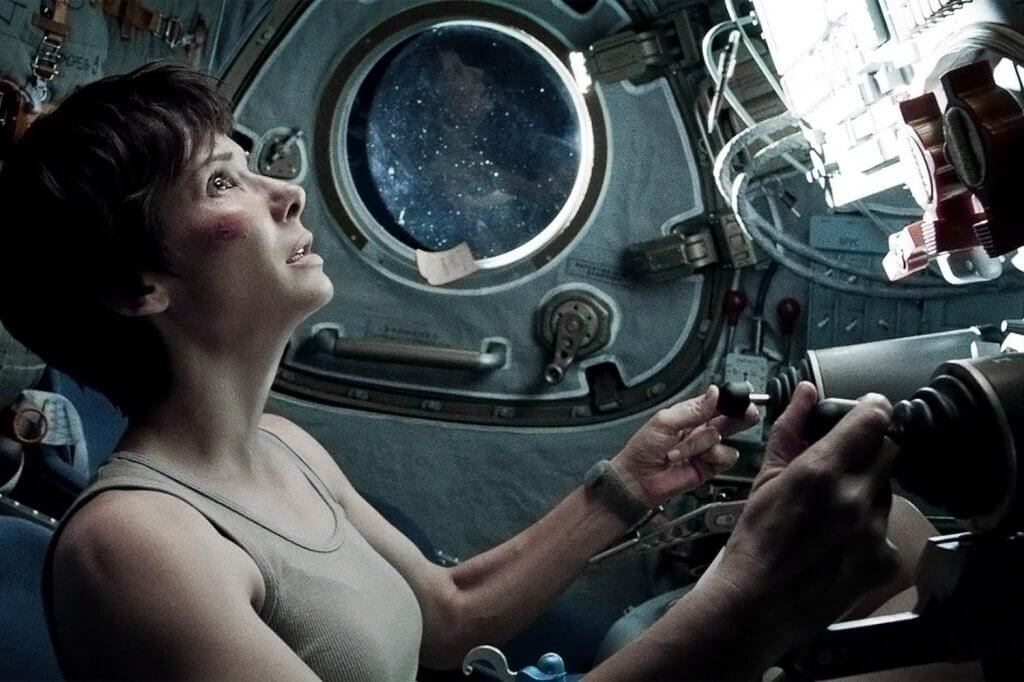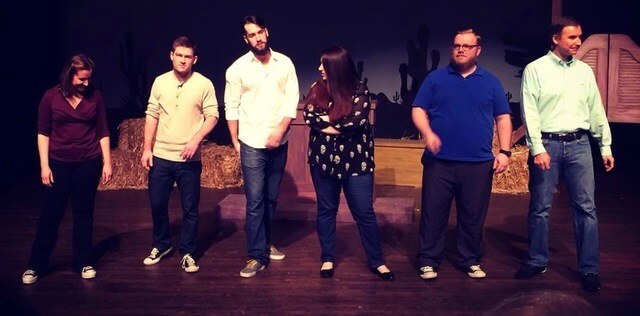I already know what you’re thinking. “I don’t want to write comedy. Improv isn’t relevant to me.” Well, you’re wrong. Flat wrong. Improv will help you, in more ways than one. And if you’re a writer, it will not only make your writing better, but it will make it easier too.
The improv scene in Atlanta is alive and kicking. After taking many, many classes, and watching many, many shows, here are five big takeaways I’ve gleaned:
1) Say yes

This is the number one rule in improv. If you say no, you’re blocking. Not only is it not fair to your scene partner(s) but you’re holding up action. Saying yes is what allows the story to move forward.
Apply this to your screenplay. Saying yes doesn’t have to be explicit, but it has to mean your character is willing to continue the journey. It doesn’t matter if they are asked by another character, or decide to attempt the journey themselves. They must say yes to move forward.
Imagine if Luke Skywalker never decided to leave Tatooine. Imagine if Indiana Jones never decided to go after the Ark. Imagine if the Dude never decided to go get his rug back. (I mean, it really tied the room together.) Without your main characters saying yes to the journey before them, you don’t have a story.
All that may be a little obvious, but saying yes can lead to very interesting stories. A great way to find a story is to find the last thing your character would want to do, and make them say yes to doing it. The man afraid of heights says yes to a K2 summit climb. The woman afraid of public speaking decides to run for her state senate.
If you’re still figuring out where your story is going, just have your main character start saying yes to what’s put in front of him. You’ll be surprised by what you find out.
2) Keep it simple and stay focused
If I’m doing an improv scene where my character wakes up and has baseball bats for arms, it’s funny because it’s absurd. My scene partner(s) and I can explore the comedy of what that’s like, and have fun with that single concept. The audience can follow along easily, because other than baseball bat arms, everything else in the scene we is completely normal and relatable.
Now imagine a scene where I have baseball bats for arms, my scene partner speaks only in gibberish, we are miming owning a cat that continuously combusts into fire but doesn’t get hurt (the Feline Torch?) and we live on a moon base in the year 3045. Sure it sounds funny, but in all likelihood that scene will flounder because there is way too much going on. Not only will it be a difficult story to tell, but the audience will have difficulty finding what’s funny because everything is absurd.
By maintaining focus, you allow your audience to zero in on the essence of your story. In the case of an improv scene, this is usually the comedy, specifically what is funny about the scene. However, in a screenplay it can be anything you want. By having a clear, focused story, you can create depth and explore characters without confusing the audience because they can easily follow what’s going on.

I’m alive, but not safe yet and the audience knows where they are in the movie? Check.
Gravity is a film that does this well. It employs very clearly focused storytelling. The motivation is simple: stay alive and get back to Earth. Director Alfonso Cuaron allows the audience to explore the psyche of Dr. Ryan Stone (Sandra Bullock) because he knows that we always know where we are in relation to the story. Is she still alive? Yes. Is she safe yet? No. By keeping it simple and staying focused, the audience will use less energy figuring out what’s going on and more exploring what it means and how it makes them feel.
3) Do things
A good way to keep an improv scene interesting is to be doing an activity. The scene may have nothing to do with that activity but it makes it way more intriguing to the audience. It provides depth and realism, as well as some movement and action in what could turn into a talking head scene.
Imagine a man consoling his buddy whose wife just left him. This scene could take place at a bar and they could just sit there. Now imagine the exact same scene with the same dialogue, but they’re lumberjacks and they’re chopping and piling wood. All of a sudden, the scene is on it’s feet and things are going on.This little trick can come in handy in a screenplay in a number of ways.

Firstly, and most importantly, it will make it more visually interesting, which is important when your medium is primarily visual. Secondly, it can make production easier. If your scene is just dialogue, and location isn’t essential, then it opens up a world of possibilities for locations. And some locations are easier to book or replicate than others.
You originally placed the scene in a swanky hotel bar, but it is way too expensive to book. What if the scene takes place in a park, with the characters feeding ducks? It gives them an activity, parks are everywhere, and feeding ducks is an interesting activity. Thirdly, an interesting activity can hide some otherwise boring bits of dialogue, particularly exposition that must happen. Blake Snyder, in Save The Cat, calls this “The Pope In The Pool” trick. He describes a film in which a boring scene takes place while the Pope is swimming in his own personal pool. He was so intrigued by this, that he didn’t realize he just sat through minutes of boring exposition.
4) Bring it back
Callbacks are more than just funny. They provide a sense of closure, and give us a good warm feeling inside, even if they aren’t played for comedy. If I do an improv scene in which I’m a cotton candy salesman selling a bag to a small girl, that’s more than enough to tell a whole story that still takes interesting turns. Sure the cotton candy salesman could get abducted by aliens, travel to Mars, where he meets Arnold Schwarzenegger, and they discover the cure for baldness and then wage war on Saturn. That could all be great, but if he has this whole adventure, and then returns to complete the sale and give the girl her cotton candy, that could provide the button to make an otherwise crazy scene a great little yarn.
If it isn’t at least hinted at or referenced in Act 1, it shouldn’t appear in Act 3.

Anton Chekhov taught us that if you introduce a gun in Act 1, it better go off by Act 3.It works the other way too. If you have a gunshot in Act 3, guns shouldn’t appear in your screenplay out of nowhere. Set yourself up for callbacks and open threads, and when you start wrapping them up in Act 3, the audience will leave feeling good. Watch the film The Patriot with Mel Gibson, and list the many mini story lines and callbacks throughout that film. You’d be surprised at how many there are.
Having callbacks also helps maintain the reality of the world. When Maximus kisses his figurines in Gladiator, and we see him do it repeatedly, we understand something about him as a family man. As we see him reach down and smear some dirt, soil or sand on his hands before battle, we learn something about him as a soldier. If he had only done these actions once, would we understand as much about his character?
Sitcoms are some of the biggest offender when it comes to introducing traits and characters for comedy within a single episode and then never referencing them again. One of my favorite shows, Scrubs, does a great job about brining back small gags and semi-recurring characters. Not only do you get to revisit a favorite joke, but it provides a sense of realism to the world, and isn’t introduced simply for the sake of a cheap laugh.
5) Relationships rule
This is the biggest thing I’ve learned from improv. Characters are great, but relationships between characters are the lifeblood of great stories. Two people navigating a spaceship through an asteroid field is interesting, but if those two people are brothers who are in love with the same woman, then you’ve really got something. In improv, establishing a relationship between two people will make the audience care for the characters. Not only will it become easier to follow, but the laughs will be stronger.
Blues Brothers is great not just because of Jake & Elwood’s individual characters, but because of the way they interact with each other. Another reason I love Scrubs (see me bringing it back?) is because the relationships between the characters are so well established, and each one is unique. Check out the relationship between these two:
If you’re writing a screenplay, think about how the characters interact and what they mean to each other. How would it change if the two leads were blood related, or both orphans, or complete strangers? Think about their relationship and allow it to change throughout the story. Characters have arcs, so make sure their respective relationships do too.
Taking a few improv classes will dramatically improve your writing. Your mind will be open to exploring more ideas, and you will understand your scenes better and be able to write them more honestly and organically. Not only that, but you’ll become a better listener and communicator too. Who knows, maybe you’ll even get funnier.
The improv scene in Atlanta is alive and well. It is a tremendously supportive community, and I’d personally recommend getting involved. I’ve taken a few classes and even performed in a few shows. Besides the fact that my writing has improved, I’ve had tons of fun, made some great friends and learned about myself.

Check out a few of the links below for more improv resources in the area, as well as some of the more famous improv houses in the nation.
- Dad’s Garage
- Automatic Improv
- Basement Theatre
- The Village Theatre
- Whole World Improv Theatre
- Upright Citizens Brigade
- The Groundlings
- The Second City
Personal favorites are Dad’s Garage in Atlanta and UCB in New York, but almost all improv theatres offer classes at a reasonable rate. Take one now, have a few laughs, and become a better storyteller.

One Response
Completely agree and appreciate you putting these points down, as reference and reminders.